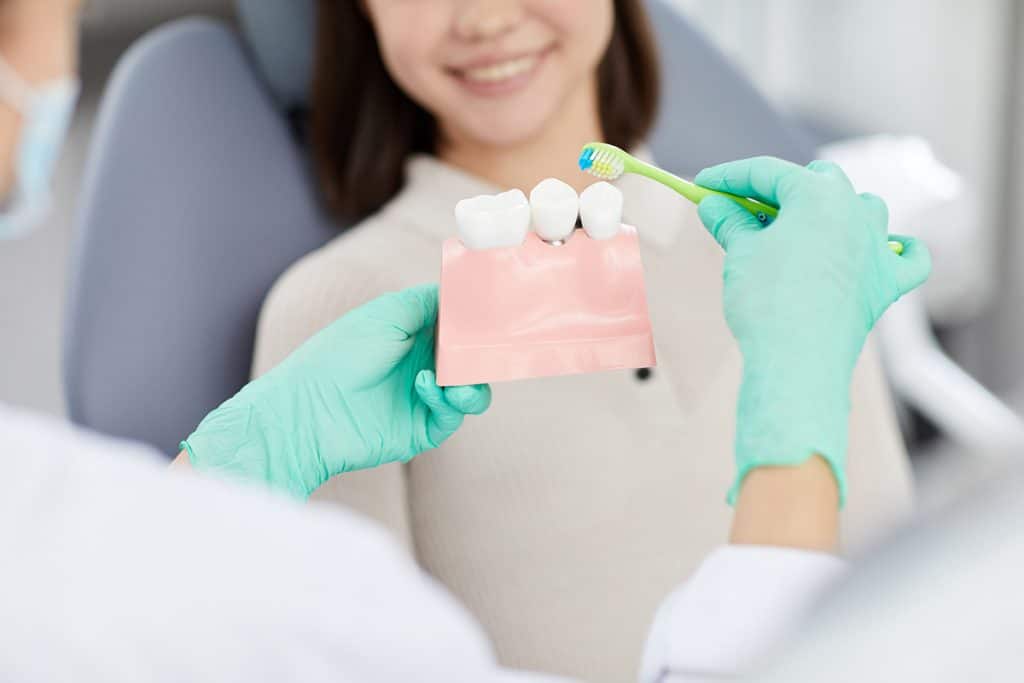How Long Do Dental Implants Last?

Dental implants are used to replace missing teeth. They are surgically placed in the jawbone, which functions as the roots of missing teeth.
Whether you’re missing a tooth or teeth due to periodontal disease, injury, or some other reason, dental implants are effective at improving the function and appearance of your smile.
Dental implants are considered a permanent and natural-looking solution for missing teeth because the process of placing dental implants involves a surgical procedure that cannot be reversed. Once placed, the implant heals and integrates with the bone over a period of several months. Once the implant has fully integrated with the bone, a dental crown or bridge is attached to the implant, completing the restoration.
Dental implants are a durable and long-lasting solution for missing teeth, and they can help to preserve the jawbone and prevent it from deteriorating. Although considered a permanent solution, many patients ask how long dental implants actually last. Here’s what you need to know.
Components of Dental Implants
Dental implants have three main components:
- The implant: This is a small, titanium post that is surgically placed into the jawbone to serve as a replacement for the root of the missing tooth. The implant is typically made of high-grade titanium, which is biocompatible and can fuse with the bone tissue over time.
- The abutment: This is a connector piece that is attached to the top of the implant and provides a secure connection between the implant and the restoration (the artificial tooth). The abutment is usually made of a metal such as titanium or gold.
- The restoration: This is the artificial tooth (also known as a crown) that is attached to the abutment and sits on top of the gum line. The restoration can be made of a variety of materials, including porcelain, zirconia, or a combination of materials. It is designed to function and look like a natural tooth.
In some cases, a dental implant may also include a fourth component known as a "healing collar" or "healing abutment." This is a temporary piece that is placed on top of the implant during the healing process after surgery, to protect the implant and provide a smooth surface for the gum tissue to heal around.
Once the implant has fully healed, and the gum tissue has stabilized, the healing collar is removed, and the permanent abutment and restoration are placed.
How Long Do Dental Implants Last?
Dental implants are designed to be long-lasting with proper care. However, the specific lifespan of a dental implant will depend on various factors, including the quality of the implant, the individual's oral hygiene habits, and the overall health of the patient.
On average, dental implants have a success rate of 95% or higher after five years. This means that after five years, 95% or more of dental implants are still functional and in place. However, some dental implants may last for much longer than five years, while others may need to be replaced after a shorter period of time.
To ensure the longevity of a dental implant, it is important to practice good oral hygiene habits, such as brushing and flossing regularly, and to visit the dentist for regular checkups and cleanings. It is also important to follow the care instructions provided by your dentist, which may include avoiding certain types of foods or activities that could potentially damage the implant.
Benefits of Dental Implants
There are several benefits to dental implants, including:
- Improved appearance: Dental implants can look and feel just like natural teeth, and can be used to replace a single missing tooth or multiple missing teeth. This can improve the appearance of your smile and restore your confidence.
- Improved function: Dental implants can help you eat, speak, and chew more effectively, as they are designed to function just like natural teeth.
- Durability: With proper care, dental implants can last for many years, making them a long-lasting solution for replacing missing teeth.
- Convenience: Unlike dentures, which can be removed and require special care and cleaning, dental implants are permanent and do not require any special maintenance beyond good oral hygiene habits.
- Improved oral health: Dental implants do not require the reduction of surrounding teeth, as is sometimes necessary with traditional bridges. This helps to preserve the natural teeth and can improve overall oral health.
- Increased comfort: Because dental implants are anchored to the jawbone, they can provide a stable and secure fit, which can be more comfortable than dentures or traditional bridges.
- Improved quality of life: Dental implants can improve your overall quality of life by restoring your ability to eat, speak, and smile confidently.
Learn More About Dental Implants at Cranston Cosmetic Dentistry
If you want a solution that looks, feels, and functions like natural teeth, then dental implants are your best solution. They do much more than replace missing teeth. They help maintain and strengthen bone structure, provide the ability to chew healthy food, and give patients the confidence to smile. They also protect existing teeth by helping to preserve bone structure.
To learn more about dental implants and to schedule a consultation, contact us at either of our convenient offices in Cranston or East Greenwich.

